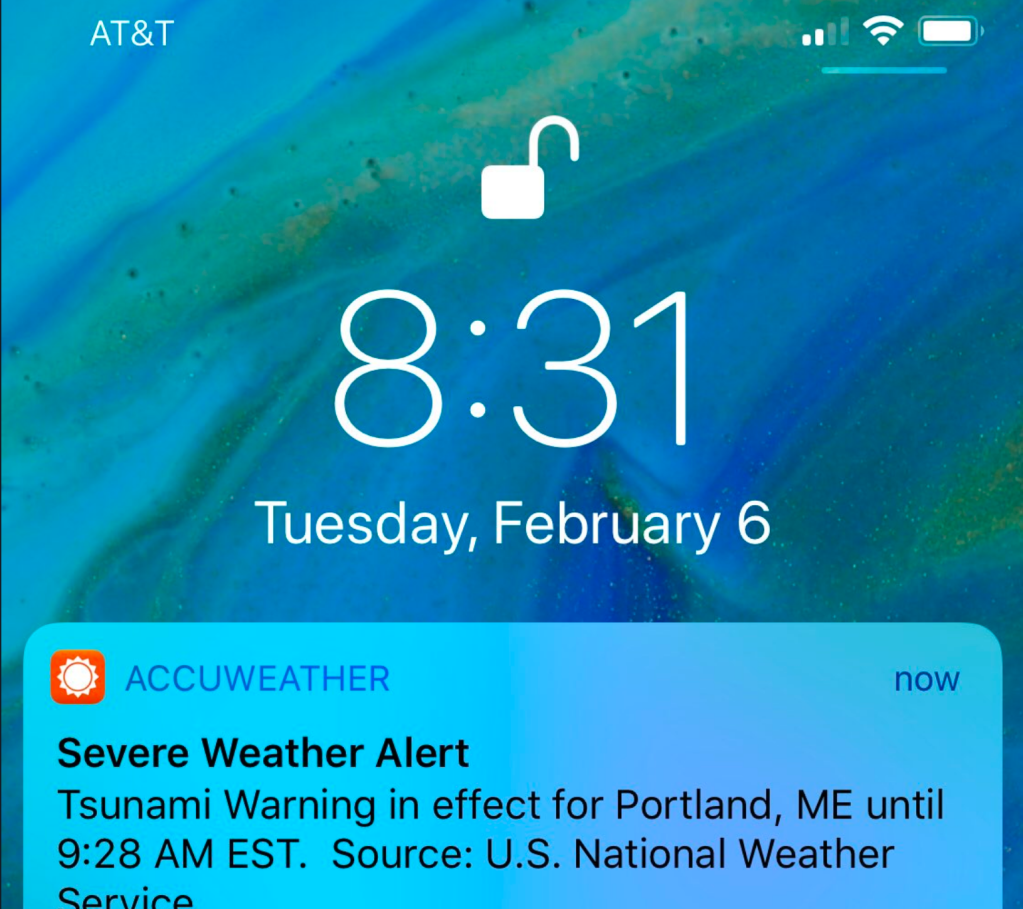PEAKS ISLAND — A mistaken text message. I get it. It probably happens to all of us in our overconnected world. But when the text is in the form of what appears to be an official warning, that is a bigger mistake.
I have received warning texts before. The last one was, I think, a blizzard warning sometime last year. But when I received a tsunami warning, and I was thousands of miles away from home, it got me thinking about the purpose of these messages, the longer-term impact of fake messages and the eerie feeling of being tracked, even if I don’t want to be tracked.
First, the message. I received the text from AccuWeather about the tsunami warning for Portland, Maine. I knew it couldn’t be real, but it appeared to be a real warning. It was from AccuWeather. I have their application on my cellphone. This is the same company whose CEO has been nominated to oversee the National Weather Service. A reputable organization, right?
I’d never received anything fake from them before, at least I think I haven’t. Maybe the blizzard warning last winter was fake, but I don’t think so. Being some 8,000 miles away when I received the message, there wasn’t much I could really do about it. I called home, emailed some friends, checked other news sources. No other news source mentioned an impending tsunami. Hours later I received another text message, which announced that the first message was fake.
I deleted my AccuWeather app immediately. At this point, I’ll take my chances that weather events not reported on some news source that distills, translates and ponders what to offer is probably more reliable than a fast-moving text alert with no substance or backup.
Second, as text and tracking technology is further and further refined, it seems plausible that other mistakes will also occur. So what happens when it’s not a mistake? What happens when it’s a real issue or matter and action is required to be taken immediately? As the false alarms mount, it seems that the effectiveness of sending an emergency message at all is jeopardized. I know for me I have begun to question the relevance of emergency messaging systems. Also, as the definition of an emergency changes, it seems possible that emergency text messages could become as commonplace as those fake email messages purporting to be from a friend who’s stuck in a faraway country and needs money wired to them immediately.
Much like that fake email scam, it seems to me when this happens, the usefulness of having this technology is lost in the messaging. If even a small percentage of the population who receive these emergency messages ignores them, and it is a valid emergency, this negates the purpose of pushing emergency messages to all mobile phone subscribers in the first place.
I turned off the function on my cellphone to receive wireless emergency alerts. That means that I will no longer receive messages about national emergencies, weather emergencies or presidential directives. I’ll take my chances. If, as Chicken Little cries, the sky is in fact falling, I will experience it along with everyone else who opts out of emergency text messages. Seems blissful not to know.
Then there’s the tracking issue. I love the tracking feature on my cellphone. I’ve used it to find family members, prepare for their arrival based on their current location and even meet them somewhere in between. In all of these cases, my family members and I “opt in” to track each other. When I receive messages that I am not sure if I “opted in,” however, it seems to be an invasion of privacy. If the location of my cellphone is used to track me, how can that tracking then be used to push other messages to me?
As the technology evolves, does this mean I will soon be receiving messages about friends who may be in the neighborhood, shops that offer me things for sale, discounts, open tables at restaurants during the lunch or dinner hour? Where does it stop? I am not sure I want to opt out of this feature. However, given the AccuWeather text, maybe it’s a good idea.
Send questions/comments to the editors.


